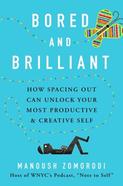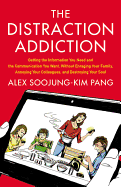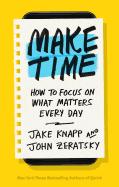Did you ever complain of being bored as a child, simply to be told that "only boring people are bored"? It was a fairly constant refrain in my own childhood, and as frustrating as it was to hear at the time, it turns out there may have been some truth in the old adage, as these authors suggest.
 In 2015, Manoush Zomorodi, creator of the popular radio show and podcast Note to Self, led listeners through a weeks-long experiment to unplug from their devices and free up time in their days to just be bored. This experiment forms the backbone of her book, Bored and Brilliant (Picador, $18), which expands on the connection between boredom and creativity. Backed with scientific research and data, Zomorodi's book invites us to step away from Facebook and let one's mind wander--in the name of productivity!
In 2015, Manoush Zomorodi, creator of the popular radio show and podcast Note to Self, led listeners through a weeks-long experiment to unplug from their devices and free up time in their days to just be bored. This experiment forms the backbone of her book, Bored and Brilliant (Picador, $18), which expands on the connection between boredom and creativity. Backed with scientific research and data, Zomorodi's book invites us to step away from Facebook and let one's mind wander--in the name of productivity!
 In The Distraction Addiction (Little, Brown, $29), Alex Soojung-Kim Pang offers readers additional suggestions for how to unplug in a digital world. Neither Zomorodi nor Pang are Luddites, arguing for the removal of all phones or connectivity, however; both urge us to find balance between the usefulness of our devices and the need for distraction-free time in order to do our best thinking. Pang expands on this theory about disconnecting in his second book, Rest: Why You Get More Done When You Work Less (Basic Books, $16.99.
In The Distraction Addiction (Little, Brown, $29), Alex Soojung-Kim Pang offers readers additional suggestions for how to unplug in a digital world. Neither Zomorodi nor Pang are Luddites, arguing for the removal of all phones or connectivity, however; both urge us to find balance between the usefulness of our devices and the need for distraction-free time in order to do our best thinking. Pang expands on this theory about disconnecting in his second book, Rest: Why You Get More Done When You Work Less (Basic Books, $16.99.
 Some of these same tips are repeated--and joined by new pieces of advice and suggestions--in Make Time: How to Focus on What Matters Every Day (Currency, $27), in which two tech gurus expound on the ways they have adjusted their own technology use to make technology work for them, rather than as a distraction. Up next on my own reading list in this category is How to Do Nothing (Melville House, $25.99) by Jenny Odell, which promises suggestions for "resisting the attention economy." --Kerry McHugh, blogger at Entomology of a Bookworm
Some of these same tips are repeated--and joined by new pieces of advice and suggestions--in Make Time: How to Focus on What Matters Every Day (Currency, $27), in which two tech gurus expound on the ways they have adjusted their own technology use to make technology work for them, rather than as a distraction. Up next on my own reading list in this category is How to Do Nothing (Melville House, $25.99) by Jenny Odell, which promises suggestions for "resisting the attention economy." --Kerry McHugh, blogger at Entomology of a Bookworm

